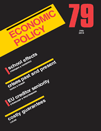Bacchetta, P. & Benhima, K. (2014) “The role of corporate saving in global rebalancing“, VoxEU Organisation, 24 August. Among the various explanations behind global imbalances, the role of corporate saving has received relatively little attention. This column argues that corporate saving is quantitatively relevant, and proposes a theory that is consistent with the stylised facts and useful for understanding the current phase of global rebalancing. The theory implies that, …Read More
Evaluating the cost of government credit support: the OECD context
Lucas, D. (2014) “Evaluating the cost of government credit support: the OECD context“. Economic Policy, Vol. 29, Issue 79, pp. 553-597. Governments throughout the OECD allocate a large share of societies’ capital and risk through their credit-related activities. Hence, accurate cost estimates for credit support programmes are a prerequisite for efficient resource allocation, transparency, effective management and public oversight. I find that OECD governments generally take their cost of capital …Read More
The role of creditor seniority in Europe’s sovereign debt crisis
Steinkamp, S. & Westermann, F. (2014) “The role of creditor seniority in Europe’s sovereign debt crisis“. Economic Policy, Vol. 29, Issue 79, pp. 495–552. The share of public debt that is held by lenders with preferred creditor status (i.e. the IMF, ECB, ESM, etc.) has increased substantially during Europe’s sovereign debt crisis. Empirically, we document in both macro and survey data that there exists a close relationship between the increase …Read More
Can large primary surpluses solve Europe’s debt problem?
Eichengreen, B. & Panizza, U. (2014) “Can large primary surpluses solve Europe’s debt problem?“, VoxEU Organisation, 30 July. For the debts of European countries to be sustainable, their governments will have to run large primary budget surpluses. But there are both political and economic reasons to question whether this is possible. The evidence presented in this column is not optimistic about Europe’s crisis countries. Whereas large primary surpluses for …Read More
Why is financial stability essential for key currencies in the international monetary system?
Goldberg, L., Krogstrup, S. & Rey, H. (2014) “Why is financial stability essential for key currencies in the international monetary system?“, VoxEU Organisation, 26 July. The dollar’s dominant role in international trade and finance has proved remarkably resilient. This column argues that financial stability – and the policy and institutional frameworks that underpin it – are important new determinants of currencies’ international roles. While old drivers still matter, progress …Read More
Asset-backed securities: The key to unlocking Europe’s credit markets?
Altomonte, C. & Bussoli, P. (2014) “Asset-backed securities: The key to unlocking Europe’s credit markets?“, Bruegel Institute, 24 July. The European market for asset-backed securities (ABS) has all but closed for business since the start of the economic and financial crisis. ABS (see Box 1) were in fact the first financial assets hit at the onset of the crisis in 2008. The subprime mortgage meltdown caused a deterioration in …Read More
When arm’s length is too far
Beck, Τ., Degryse, H., De Haas, R. & Van Horen, N. (2014) “When arm’s length is too far“, VoxEU Organisation, 25 July. The small and medium-size enterprises (SMEs) were among the most severely affected in the Global Crisis. This column discusses new evidence on how different lending techniques affect lending in bad and good times. Data from 21 countries in central and eastern Europe show that ‘relationship lending’ alleviates …Read More
How Money And Credit Work
Meyer, H. (2014) “How Money And Credit Work“, Social Europe Journal, 23 July. Do you think that in recent years, as a result of the global economic crisis, the whole discussion about public policy has become increasingly focussed on economics? And that much of the policy discussion is based on core concepts that are quite poorly understood, including by many policy-makers? If your answer to these question is yes you are not alone. At …Read More
Rebalancing in the Euro Area and Cyclicality of Current Account Adjustments
Tressel, T. & Wang, S. (2014) “Rebalancing in the Euro Area and Cyclicality of Current Account Adjustments“, Working Paper No. 14/130, International Monetary Fund, 22 Ιουλίου. The paper examines progress with the external rebalancing of euro area deficit countries. Relative prices are adjusting at different pace across countries and with different compositions of wage cuts and labor shedding. There is so far limited evidence of resource re-allocation from non-tradable …Read More
Sovereign debt markets in turbulent times: A view of the European crisis
Broner, A. F., Erce, A., Martin, A. & Ventura, J. (2014) “Sovereign debt markets in turbulent times: A view of the European crisis“, VoxEU Organisation, 23 July. By 2010, Eurozone periphery countries had faced severe debt problems and a falling credit to the private sector. This column proposes a theory to interpret these events. Governments can discriminate in favour of domestic creditors and public debts trade in secondary markets. …Read More






